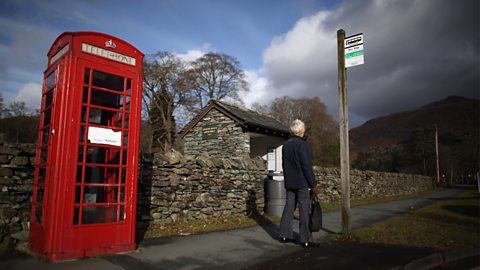Rural poverty and deprivation
Causes of rural poverty
- Low income and part-time work due to a lack of businesses and opportunities for local people in rural areas.
- Lack of services, eg health, schooling and training because there are fewer people living in rural areas to support and sustain the services.
- Infrequent public transport and high transport costs. With fewer people living there and using the public transport services, it becomes expensive for companies to operate. As a result there are less frequent services offered.
Effects of rural poverty
- When many people are employed in low paid seasonal agricultural jobs they struggle to pay bills. Many may be unemployed for large periods of the year and rely on benefits.
- The rural area is poorly connected to other areas due to a lack of bus services, poor roads and internet provision - which leads to isolation and rural deprivation.
In many deprived communities the future is uncertain. Some farmers are leaving the business altogether due to reduced profit margins and competition from overseas.
Isolation from health and education
In urban areas there is a range of health services such as clinics, pharmacies and hospitals.
Education
There are nurseries, primary and secondary schools, colleges and universities as well as a range of training centres and adult learning centres in urban areas. However, in rural communities people are vulnerable and lack these opportunities because the essential health and education services are not available locally. Some have to travel over 100 miles across borders to access health support or go to university.
Health
On the LlЕ·n Peninsula in north-west Wales, there are only three health centres serving the entire region. The main hospital is over 30 miles away in Bangor, a large town on the northern coastline of Wales. For specialist care, patients often have to travel to Liverpool, 100 miles away or Birmingham, 150 miles away.
Elderly people
Elderly people often feel more isolated than younger generations. This is because they often have more frequent visits to health services many miles away. They also rely more on public transport to take them places, which can result in longer or unreliable journeys.
